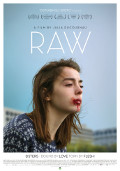
Directed by
Julia Ducournau
98 minutes
Rated R
Reviewed by
Chris Thompson

Raw
Synopsis: Following in the footsteps of her sister Alexia (Ella Rumpf),16 year old Justine (Garance Marillier) enrols as a live-in student at veterinary school where she finds herself sharing a room with Adrien (Rabah Nait Oufella) a good looking, gay party-boy. The sisters come from a strict vegetarian family but as part of the decadent and merciless initiation rites during her first week there, Justine is forced to eat raw rabbit kidneys. Justine appeals to Alexia who dismisses her pleas revealing that she, too, underwent the ritual. With the taste of raw meat in her mouth, Justine finds herself inexorably succumbing to carnivorous urges which slowly escalate from the innocence of a cafeteria hamburger to something much more insidious: human flesh.Director Julia Ducournau’s father was a dermatologist and her mother a gynaecologist and she grew up in a family where matter-of-fact discussions about the body and its ability to transform through either disease or the reproductive process were a daily occurrence. Perhaps this accounts for the sense of both wonder and abhorrence in her representations of the human body in Raw, her first feature film as writer and director (following on from her 2012 telemovie, Mange another bloody, body-related story about a bulimic woman taking revenge on her college professor).
There’s been quite a lot of fuss made about this movie as it’s made the rounds of the festival circuit, both in terms of the physical reaction it elicits from some audience members (and it’s not hard to see why it might make the more delicate members of the audience feel a tad queasy) as well as its achievement as a supposed brilliant feature debut (a response I don’t find quite as easy to comprehend). Yes, it’s an interesting film and its approach to the subject of cannibalism is distinctive and well handled. It also boasts compelling and believable performances by the relatively young cast, especially Marillier who is in almost every scene. But as a horror film I found it less spine-tingling and more stomach turning (thanks to the copious and quite realistic flesh eating scenes that highlight the work of special make-up effects artists Olivier Afonso and Amelie Grossier) which, for me at least, left it short of any deeper emotional connection beyond the sensationalism of the depraved acts being played out on screen. It’s a bit like feeling compelled to look at a car crash without a strong enough sense of concern for the people inside the car.
That’s not to say it doesn’t have it moments. At one point, Justine stumbles into the studio of an avant-garde painter who douses her almost naked body in bright blue paint and pushes her into a small room with a young man who is similarly adorned in yellow paint, with the instruction “don’t come out until you’re green”. The scene in the room is simultaneously intimate and horrifying and the result exemplifies the ambiguity of Justine’s flesh fetish affliction. Is it monstrous or is it somehow innately human? At times it’s frustratingly hard to tell (at least it was for me) whether this film is intending to be darkly comedic (it has those moments) or grossly horrifying (it has those moments too).
Really, Justine just wants to fit in, firstly with her family but also with her fellow students (even if she’s taking bites out of them as she’s getting to know them). Of course, there are many so-called horror films that are more about sexual discovery and coming-of-age than they are about supernatural or abhorrent practices and, for the most part, that’s where this film sits. It’s not unlike last year’s The Neon Demon in the way it uses horror film tropes to explore the nature of sexuality and primal instincts. But whilst I can see all that up there on the screen, it didn’t ultimately coalesce for me.

Want more about this film?


Want something different?




